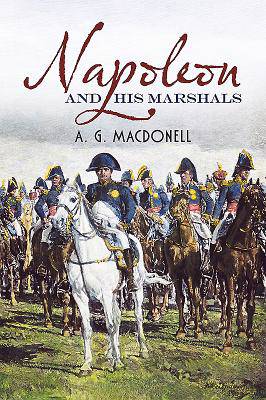
- Afhalen na 1 uur in een winkel met voorraad
- Gratis thuislevering in België vanaf € 30
- Ruim aanbod met 7 miljoen producten
- Afhalen na 1 uur in een winkel met voorraad
- Gratis thuislevering in België vanaf € 30
- Ruim aanbod met 7 miljoen producten
Zoeken
€ 39,95
+ 79 punten
Uitvoering
Omschrijving
Napoleon Bonaparte entered the World stage in 1793 at the siege of Toulon. This book covers the period of 1796 to 1815, from Napoleon's classic victories in Italy up to the point of his defeat at Waterloo. Napoleon created twenty-six Marshals in all and the tapestry of the book is wound around these men, their interpersonal relationships, their successes together, their constant bickering and their eventual failure. With Marshal jostling with Marshal for power and influence; to say nothing of aggrandizement, it is surprising that Napoleon succeeded to the extent that he did. The book tells the complete story of the Napoleonic Wars, but using the Marshals as the pivot around which the narrative unfolds it presents a different and interesting focus, enabling the reader to see Napoleon from an unusual angle. The book proceeds chronologically providing a first-class read and a superb account of the Napoleonic Wars. This new edition is illustrated with contemporary portraits and engravings. Although A. G. Macdonell was best known as a journalist and satirist, he was extremely well-educated and had a passion for history, especially the Napoleonic period. Having been a gunnery officer in the First World War he was able empathize with his subject, the little gunner corporal, to a degree that is not shared by armchair historians.
Specificaties
Betrokkenen
- Auteur(s):
- Uitgeverij:
Inhoud
- Aantal bladzijden:
- 224
- Taal:
- Engels
- Reeks:
Eigenschappen
- Productcode (EAN):
- 9781781550366
- Verschijningsdatum:
- 19/03/2014
- Uitvoering:
- Paperback
- Formaat:
- Trade paperback (VS)
- Afmetingen:
- 155 mm x 231 mm
- Gewicht:
- 376 g

Alleen bij Standaard Boekhandel
+ 79 punten op je klantenkaart van Standaard Boekhandel
Beoordelingen
We publiceren alleen reviews die voldoen aan de voorwaarden voor reviews. Bekijk onze voorwaarden voor reviews.







